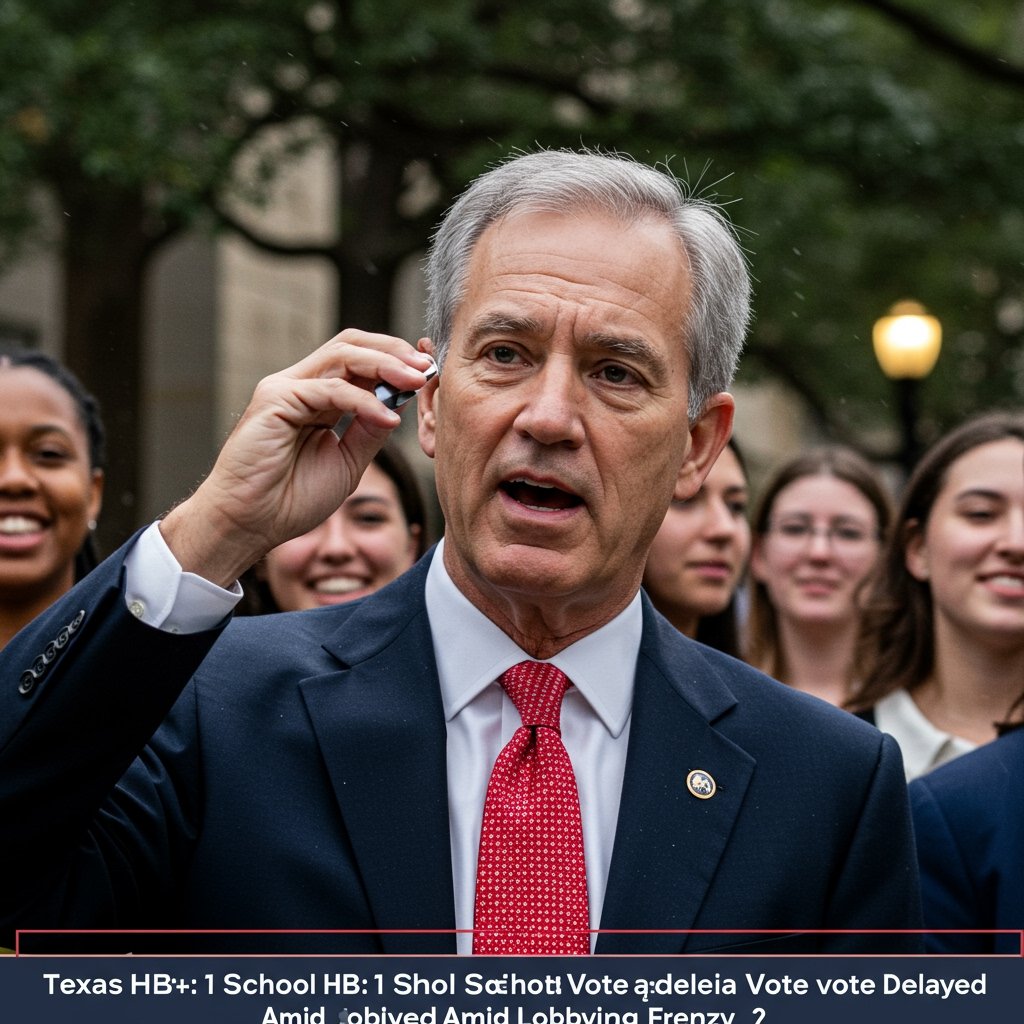Legislative Setback for Texas School Voucher Effort
A crucial vote on House Bill 1 (HB 1), a sweeping legislative package addressing school finance and featuring a highly controversial school voucher component, was unexpectedly postponed by the Texas House Public Education Committee. The vote, originally slated for Friday, February 24th, was delayed following an intense and prolonged debate held on Wednesday, February 21st. The decision marks a significant procedural setback for proponents of the bill and underscores the deep divisions and fierce political battle surrounding the use of public funds for private education in Texas.
Sources close to the Public Education Committee indicated that the primary reason behind the abrupt postponement was the overwhelming intensity of lobbying efforts exerted by advocacy groups and stakeholders on both sides of the debate. The days leading up to the scheduled vote saw a dramatic increase in activity within the Capitol, with proponents pushing hard to secure the necessary votes and opponents mounting an equally vigorous campaign to block the measure.
Lobbying Pressure Forces Postponement
The corridors of the Texas Capitol reportedly buzzed with activity as representatives from diverse interests engaged in last-minute attempts to sway lawmakers. Lobbyists, constituents, and concerned citizens flooded offices with calls, emails, and personal visits, making their positions unequivocally clear. This concentrated pressure created an environment where committee members faced significant conflicting demands, ultimately leading leadership to pump the brakes on the scheduled vote.
This level of lobbying intensity is not uncommon on major legislative items, but the volume and fervor surrounding HB 1, particularly its voucher provisions, were described by insiders as exceptionally high. The delay signals that, despite significant political will behind the bill from certain factions, the necessary consensus within the committee had not yet materialized by the February 24th deadline.
Opposition Mobilizes: Texas AFT and Rural Coalition
The opposition front was particularly vocal and well-organized, according to reports. Among the most prominent voices against the bill was Texas AFT, a major statewide educators’ union. Texas AFT has consistently opposed school voucher programs, arguing they divert essential resources away from the public school system, which serves the vast majority of Texas students.
Adding significant weight to the opposition was a notable coalition comprising both rural Republicans and Democrats. This bipartisan alliance highlights the unique concerns faced by rural communities regarding school vouchers. These districts often have limited or no private school options available to students. Consequently, diverting public funds through a voucher system is seen not as offering choice, but rather as potentially weakening their sole educational provider – the local public school – without providing a viable alternative for parents.
Concerns articulated by this coalition and other opponents centered specifically on the potential negative impact on public school funding. They argue that introducing a voucher or education savings account (ESA) program, as envisioned in parts of HB 1, could erode the financial stability of already underfunded public schools, particularly in property-poor or rural areas.
The Stakes: Public Education Funding and Parental Choice
HB 1 represents a flashpoint in a long-standing ideological debate in Texas and across the nation concerning how best to educate students and fund schools. Proponents often advocate for parental choice, arguing that mechanisms like vouchers empower parents to select the best educational environment for their children, regardless of socioeconomic status or geographic location. They contend that competition from private schools can also spur improvements within the public school system.
Critics, however, counter that taxpayer money should be exclusively dedicated to strengthening public education, which is constitutionally mandated to serve all children. They argue that voucher programs lack adequate accountability measures compared to public schools and can lead to a two-tiered system that benefits a few while undermining the many.
The inclusion of the voucher component within a broader school finance bill, as is the case with HB 1, adds another layer of complexity and contention. Opponents worry that the critical issue of adequately funding public schools is being held hostage to the passage of the controversial voucher program.
Author’s Response and Ongoing Negotiations
Representative James Frank, the author of HB 1, publicly expressed his disappointment regarding the delay. While acknowledging the setback, Rep. Frank indicated that negotiations were actively ongoing. This suggests that discussions are taking place behind the scenes involving committee members, House leadership, and potentially representatives of the various stakeholder groups.
The purpose of these negotiations is clear: to address the concerns raised by undecided or opposing members and to try and build a coalition large enough to secure the votes needed to pass the bill out of the Public Education Committee. This could involve potential amendments to the bill, changes to the proposed voucher program’s structure or funding mechanism, or other compromises aimed at winning over hesitant lawmakers.
Uncertainty Surrounds Legislative Timeline
The postponement injects a significant degree of uncertainty into the legislative timeline for HB 1. The Texas legislative session operates under strict procedural deadlines. Bills must typically clear committee by a certain date to be considered by the full House, and further deadlines exist for floor consideration and crossover to the other chamber.
A delay at this crucial committee stage puts pressure on the bill’s sponsors and supporters to quickly resolve outstanding issues and reschedule a vote if the bill is to have a viable path forward before these deadlines expire. A prolonged delay in committee could ultimately jeopardize the bill’s chances of passage during the current session.
The Path Forward
As of now, HB 1 remains in the Texas House Public Education Committee. Its future movement is contingent upon the success of the ongoing negotiations. The political will to pass some form of school finance reform, potentially including a school choice component, is evident among certain legislative leaders, but the intense lobbying and division highlight the significant hurdles that remain.
The delay serves as a stark reminder of the power of organized advocacy and the complex political dynamics at play in the Texas Legislature, particularly when dealing with high-stakes issues like the future of public education funding and the potential introduction of school vouchers. The battle over HB 1 is far from over, and the coming days and weeks will be critical in determining whether a compromise can be reached or if the bill’s progress will be stalled indefinitely.






